MENTAL HEALTH NURSING
VerifiedAdded on 2022/08/29
|13
|3376
|33
AI Summary
Contribute Materials
Your contribution can guide someone’s learning journey. Share your
documents today.
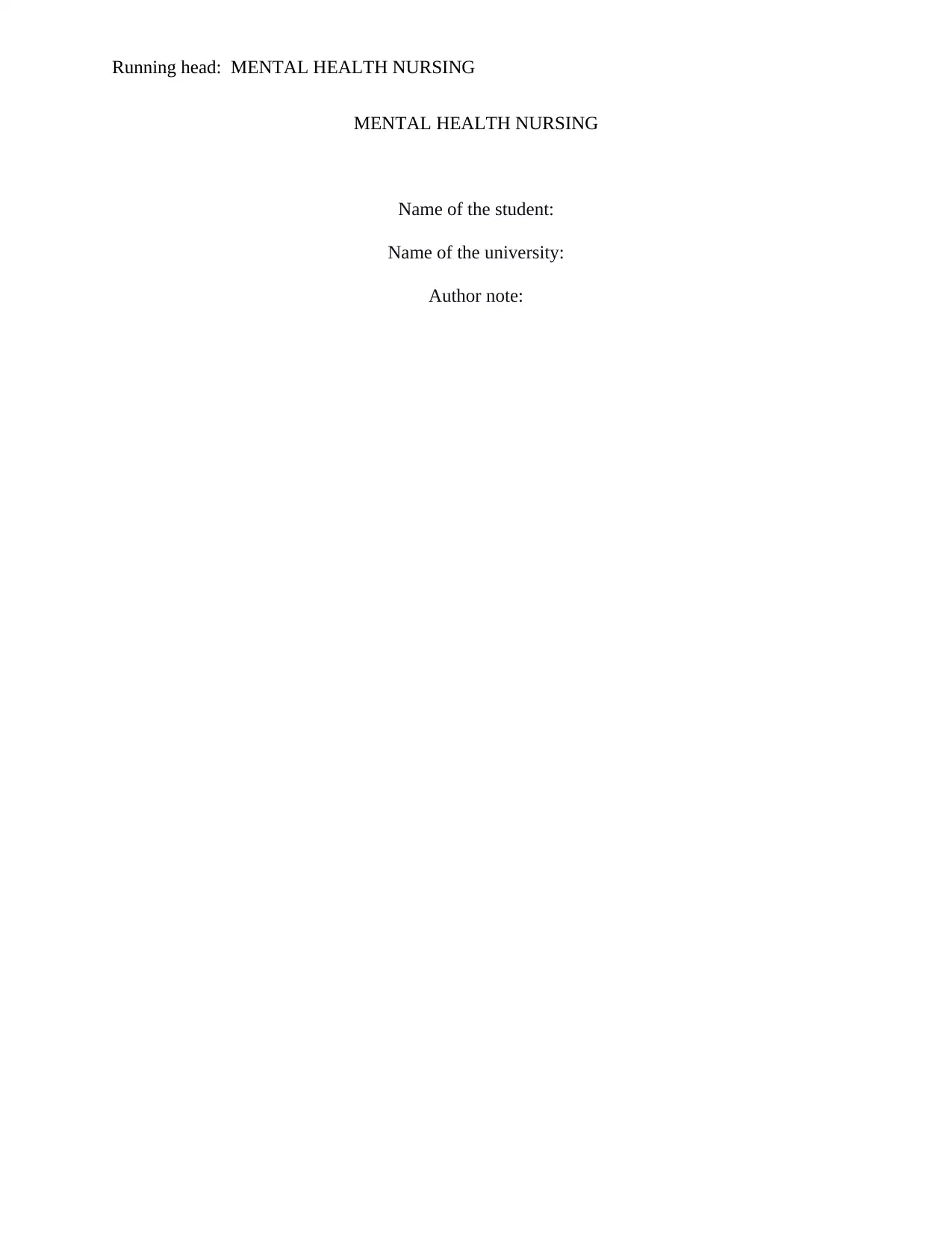
Running head: MENTAL HEALTH NURSING
MENTAL HEALTH NURSING
Name of the student:
Name of the university:
Author note:
MENTAL HEALTH NURSING
Name of the student:
Name of the university:
Author note:
Secure Best Marks with AI Grader
Need help grading? Try our AI Grader for instant feedback on your assignments.
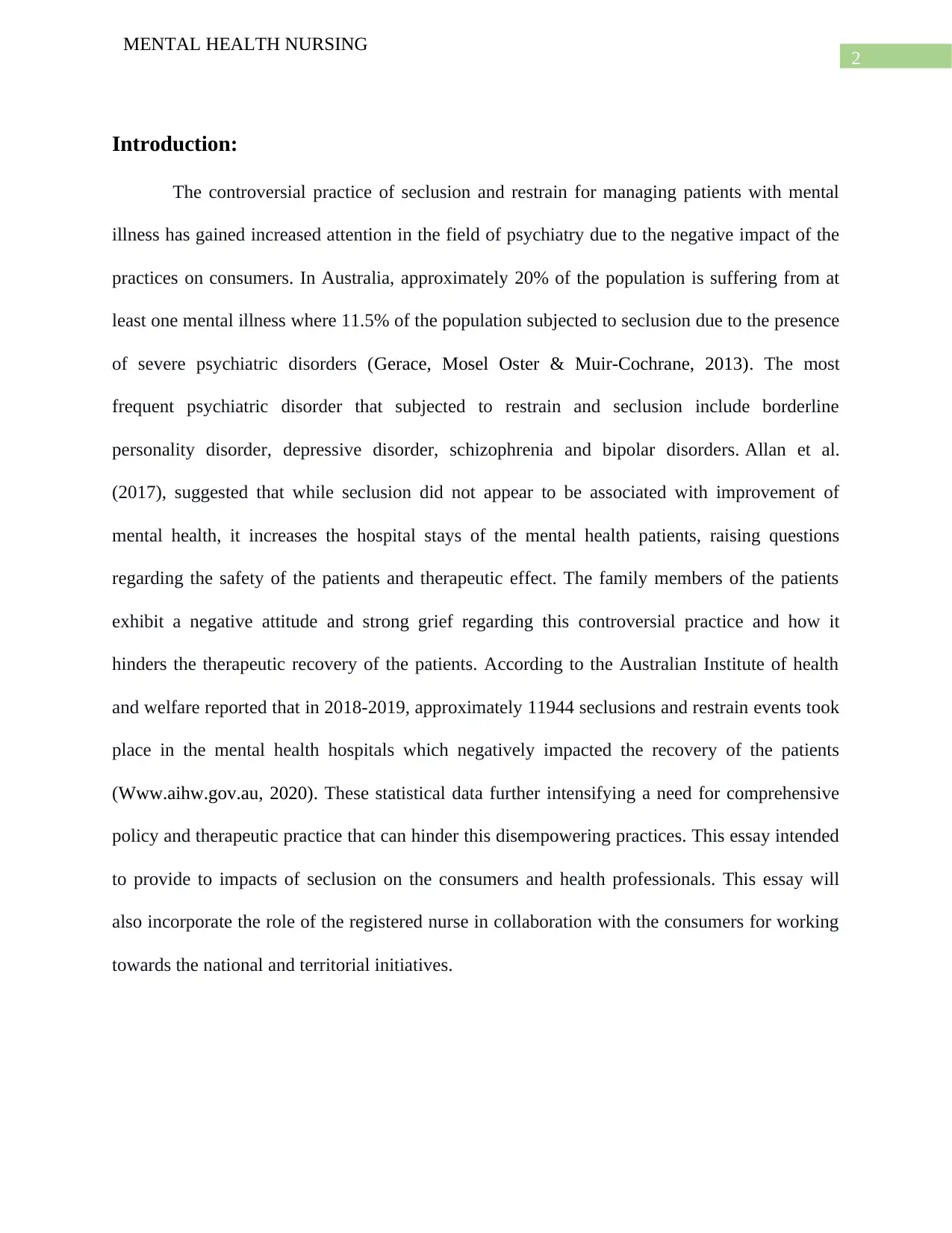
2
MENTAL HEALTH NURSING
Introduction:
The controversial practice of seclusion and restrain for managing patients with mental
illness has gained increased attention in the field of psychiatry due to the negative impact of the
practices on consumers. In Australia, approximately 20% of the population is suffering from at
least one mental illness where 11.5% of the population subjected to seclusion due to the presence
of severe psychiatric disorders (Gerace, Mosel Oster & Muir‐Cochrane, 2013). The most
frequent psychiatric disorder that subjected to restrain and seclusion include borderline
personality disorder, depressive disorder, schizophrenia and bipolar disorders. Allan et al.
(2017), suggested that while seclusion did not appear to be associated with improvement of
mental health, it increases the hospital stays of the mental health patients, raising questions
regarding the safety of the patients and therapeutic effect. The family members of the patients
exhibit a negative attitude and strong grief regarding this controversial practice and how it
hinders the therapeutic recovery of the patients. According to the Australian Institute of health
and welfare reported that in 2018-2019, approximately 11944 seclusions and restrain events took
place in the mental health hospitals which negatively impacted the recovery of the patients
(Www.aihw.gov.au, 2020). These statistical data further intensifying a need for comprehensive
policy and therapeutic practice that can hinder this disempowering practices. This essay intended
to provide to impacts of seclusion on the consumers and health professionals. This essay will
also incorporate the role of the registered nurse in collaboration with the consumers for working
towards the national and territorial initiatives.
MENTAL HEALTH NURSING
Introduction:
The controversial practice of seclusion and restrain for managing patients with mental
illness has gained increased attention in the field of psychiatry due to the negative impact of the
practices on consumers. In Australia, approximately 20% of the population is suffering from at
least one mental illness where 11.5% of the population subjected to seclusion due to the presence
of severe psychiatric disorders (Gerace, Mosel Oster & Muir‐Cochrane, 2013). The most
frequent psychiatric disorder that subjected to restrain and seclusion include borderline
personality disorder, depressive disorder, schizophrenia and bipolar disorders. Allan et al.
(2017), suggested that while seclusion did not appear to be associated with improvement of
mental health, it increases the hospital stays of the mental health patients, raising questions
regarding the safety of the patients and therapeutic effect. The family members of the patients
exhibit a negative attitude and strong grief regarding this controversial practice and how it
hinders the therapeutic recovery of the patients. According to the Australian Institute of health
and welfare reported that in 2018-2019, approximately 11944 seclusions and restrain events took
place in the mental health hospitals which negatively impacted the recovery of the patients
(Www.aihw.gov.au, 2020). These statistical data further intensifying a need for comprehensive
policy and therapeutic practice that can hinder this disempowering practices. This essay intended
to provide to impacts of seclusion on the consumers and health professionals. This essay will
also incorporate the role of the registered nurse in collaboration with the consumers for working
towards the national and territorial initiatives.
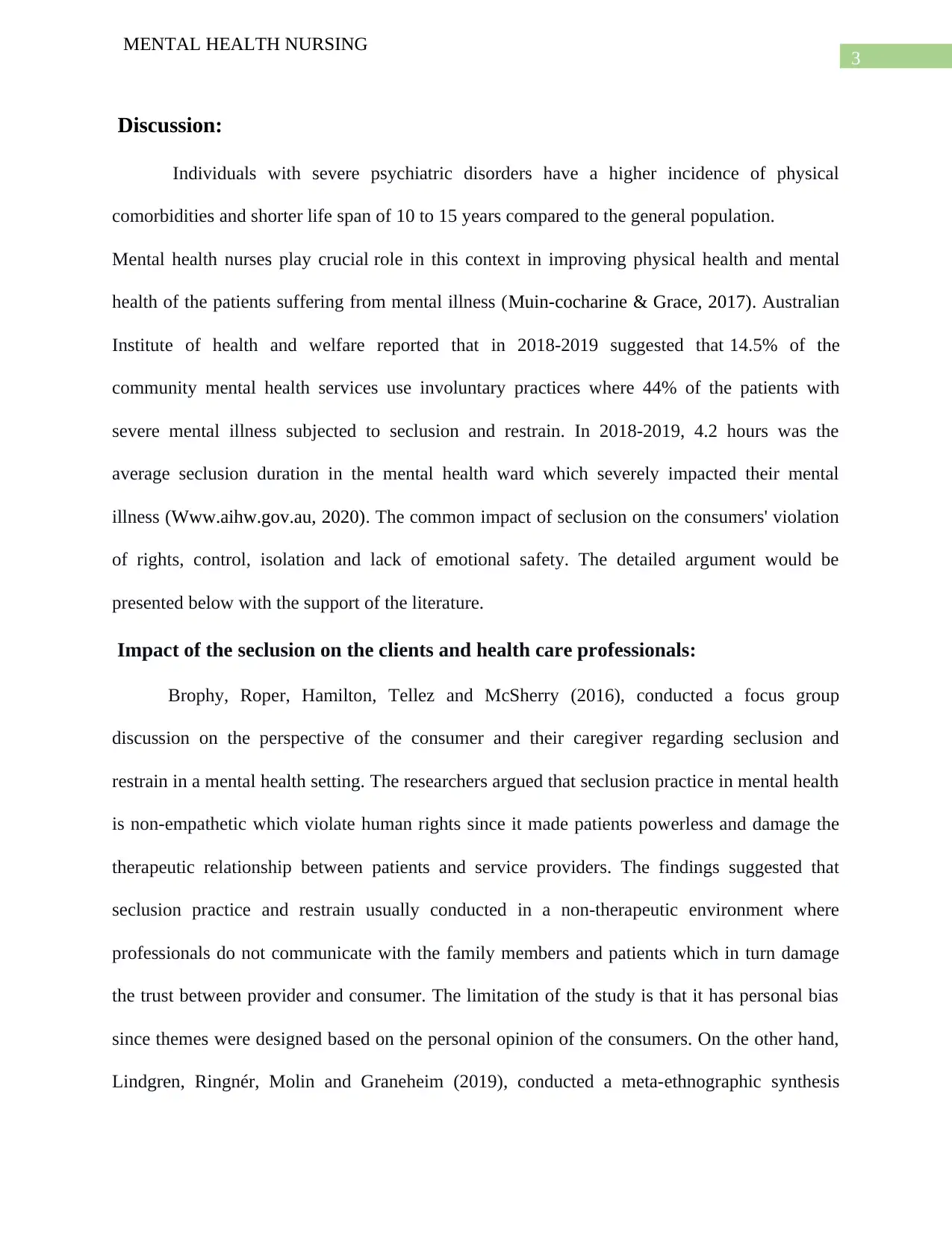
3
MENTAL HEALTH NURSING
Discussion:
Individuals with severe psychiatric disorders have a higher incidence of physical
comorbidities and shorter life span of 10 to 15 years compared to the general population.
Mental health nurses play crucial role in this context in improving physical health and mental
health of the patients suffering from mental illness (Muin-cocharine & Grace, 2017). Australian
Institute of health and welfare reported that in 2018-2019 suggested that 14.5% of the
community mental health services use involuntary practices where 44% of the patients with
severe mental illness subjected to seclusion and restrain. In 2018-2019, 4.2 hours was the
average seclusion duration in the mental health ward which severely impacted their mental
illness (Www.aihw.gov.au, 2020). The common impact of seclusion on the consumers' violation
of rights, control, isolation and lack of emotional safety. The detailed argument would be
presented below with the support of the literature.
Impact of the seclusion on the clients and health care professionals:
Brophy, Roper, Hamilton, Tellez and McSherry (2016), conducted a focus group
discussion on the perspective of the consumer and their caregiver regarding seclusion and
restrain in a mental health setting. The researchers argued that seclusion practice in mental health
is non-empathetic which violate human rights since it made patients powerless and damage the
therapeutic relationship between patients and service providers. The findings suggested that
seclusion practice and restrain usually conducted in a non-therapeutic environment where
professionals do not communicate with the family members and patients which in turn damage
the trust between provider and consumer. The limitation of the study is that it has personal bias
since themes were designed based on the personal opinion of the consumers. On the other hand,
Lindgren, Ringnér, Molin and Graneheim (2019), conducted a meta-ethnographic synthesis
MENTAL HEALTH NURSING
Discussion:
Individuals with severe psychiatric disorders have a higher incidence of physical
comorbidities and shorter life span of 10 to 15 years compared to the general population.
Mental health nurses play crucial role in this context in improving physical health and mental
health of the patients suffering from mental illness (Muin-cocharine & Grace, 2017). Australian
Institute of health and welfare reported that in 2018-2019 suggested that 14.5% of the
community mental health services use involuntary practices where 44% of the patients with
severe mental illness subjected to seclusion and restrain. In 2018-2019, 4.2 hours was the
average seclusion duration in the mental health ward which severely impacted their mental
illness (Www.aihw.gov.au, 2020). The common impact of seclusion on the consumers' violation
of rights, control, isolation and lack of emotional safety. The detailed argument would be
presented below with the support of the literature.
Impact of the seclusion on the clients and health care professionals:
Brophy, Roper, Hamilton, Tellez and McSherry (2016), conducted a focus group
discussion on the perspective of the consumer and their caregiver regarding seclusion and
restrain in a mental health setting. The researchers argued that seclusion practice in mental health
is non-empathetic which violate human rights since it made patients powerless and damage the
therapeutic relationship between patients and service providers. The findings suggested that
seclusion practice and restrain usually conducted in a non-therapeutic environment where
professionals do not communicate with the family members and patients which in turn damage
the trust between provider and consumer. The limitation of the study is that it has personal bias
since themes were designed based on the personal opinion of the consumers. On the other hand,
Lindgren, Ringnér, Molin and Graneheim (2019), conducted a meta-ethnographic synthesis
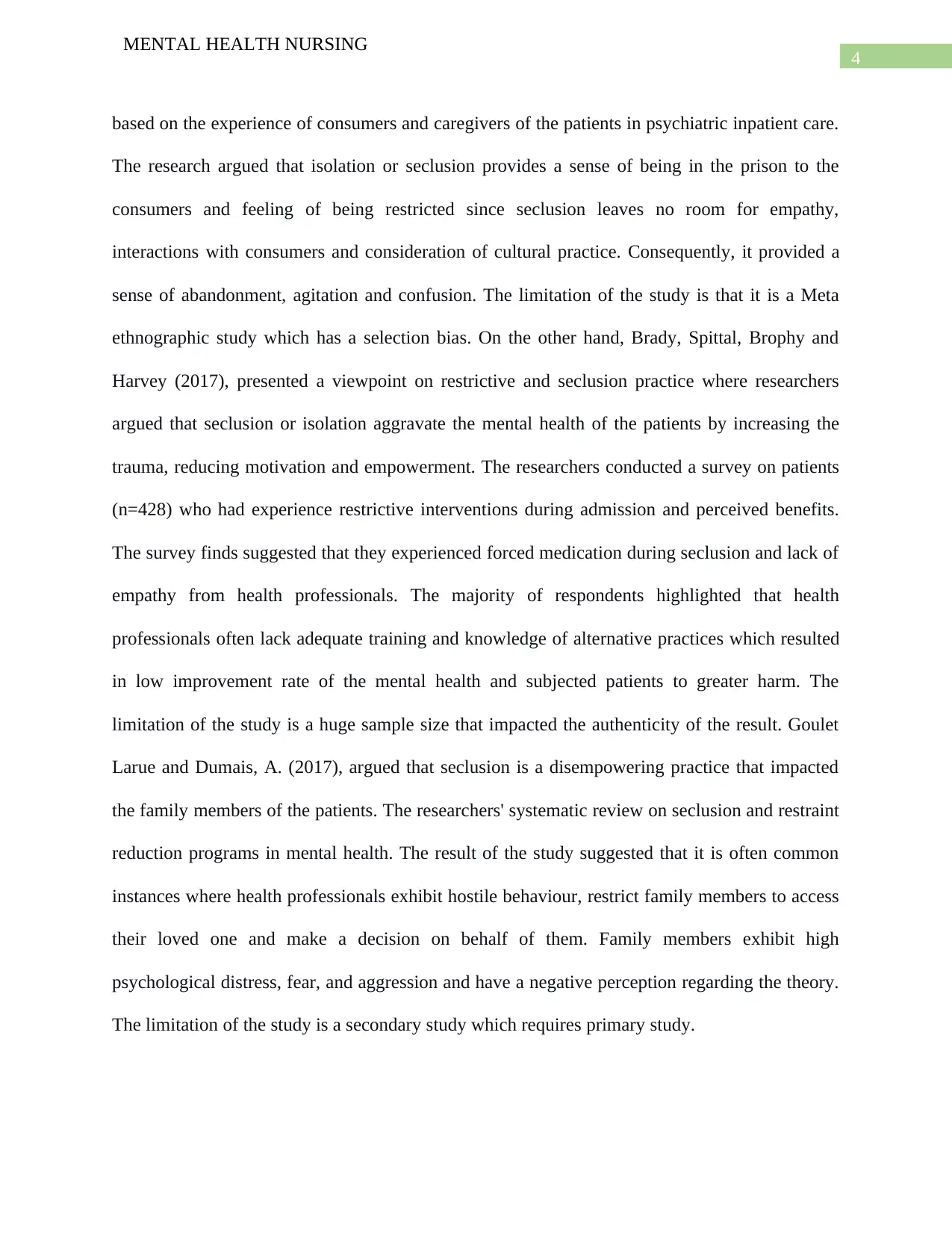
4
MENTAL HEALTH NURSING
based on the experience of consumers and caregivers of the patients in psychiatric inpatient care.
The research argued that isolation or seclusion provides a sense of being in the prison to the
consumers and feeling of being restricted since seclusion leaves no room for empathy,
interactions with consumers and consideration of cultural practice. Consequently, it provided a
sense of abandonment, agitation and confusion. The limitation of the study is that it is a Meta
ethnographic study which has a selection bias. On the other hand, Brady, Spittal, Brophy and
Harvey (2017), presented a viewpoint on restrictive and seclusion practice where researchers
argued that seclusion or isolation aggravate the mental health of the patients by increasing the
trauma, reducing motivation and empowerment. The researchers conducted a survey on patients
(n=428) who had experience restrictive interventions during admission and perceived benefits.
The survey finds suggested that they experienced forced medication during seclusion and lack of
empathy from health professionals. The majority of respondents highlighted that health
professionals often lack adequate training and knowledge of alternative practices which resulted
in low improvement rate of the mental health and subjected patients to greater harm. The
limitation of the study is a huge sample size that impacted the authenticity of the result. Goulet
Larue and Dumais, A. (2017), argued that seclusion is a disempowering practice that impacted
the family members of the patients. The researchers' systematic review on seclusion and restraint
reduction programs in mental health. The result of the study suggested that it is often common
instances where health professionals exhibit hostile behaviour, restrict family members to access
their loved one and make a decision on behalf of them. Family members exhibit high
psychological distress, fear, and aggression and have a negative perception regarding the theory.
The limitation of the study is a secondary study which requires primary study.
MENTAL HEALTH NURSING
based on the experience of consumers and caregivers of the patients in psychiatric inpatient care.
The research argued that isolation or seclusion provides a sense of being in the prison to the
consumers and feeling of being restricted since seclusion leaves no room for empathy,
interactions with consumers and consideration of cultural practice. Consequently, it provided a
sense of abandonment, agitation and confusion. The limitation of the study is that it is a Meta
ethnographic study which has a selection bias. On the other hand, Brady, Spittal, Brophy and
Harvey (2017), presented a viewpoint on restrictive and seclusion practice where researchers
argued that seclusion or isolation aggravate the mental health of the patients by increasing the
trauma, reducing motivation and empowerment. The researchers conducted a survey on patients
(n=428) who had experience restrictive interventions during admission and perceived benefits.
The survey finds suggested that they experienced forced medication during seclusion and lack of
empathy from health professionals. The majority of respondents highlighted that health
professionals often lack adequate training and knowledge of alternative practices which resulted
in low improvement rate of the mental health and subjected patients to greater harm. The
limitation of the study is a huge sample size that impacted the authenticity of the result. Goulet
Larue and Dumais, A. (2017), argued that seclusion is a disempowering practice that impacted
the family members of the patients. The researchers' systematic review on seclusion and restraint
reduction programs in mental health. The result of the study suggested that it is often common
instances where health professionals exhibit hostile behaviour, restrict family members to access
their loved one and make a decision on behalf of them. Family members exhibit high
psychological distress, fear, and aggression and have a negative perception regarding the theory.
The limitation of the study is a secondary study which requires primary study.
Secure Best Marks with AI Grader
Need help grading? Try our AI Grader for instant feedback on your assignments.
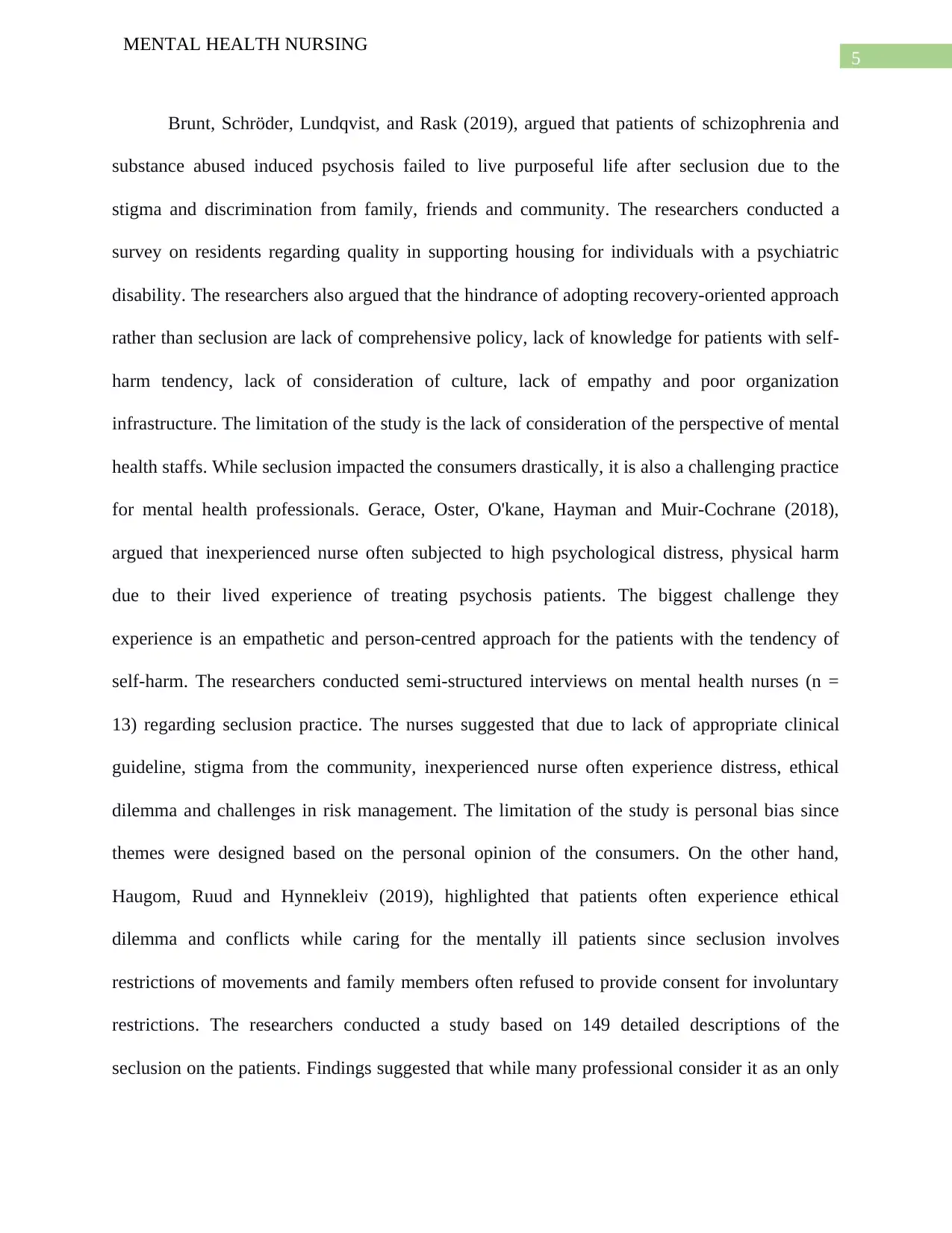
5
MENTAL HEALTH NURSING
Brunt, Schröder, Lundqvist, and Rask (2019), argued that patients of schizophrenia and
substance abused induced psychosis failed to live purposeful life after seclusion due to the
stigma and discrimination from family, friends and community. The researchers conducted a
survey on residents regarding quality in supporting housing for individuals with a psychiatric
disability. The researchers also argued that the hindrance of adopting recovery-oriented approach
rather than seclusion are lack of comprehensive policy, lack of knowledge for patients with self-
harm tendency, lack of consideration of culture, lack of empathy and poor organization
infrastructure. The limitation of the study is the lack of consideration of the perspective of mental
health staffs. While seclusion impacted the consumers drastically, it is also a challenging practice
for mental health professionals. Gerace, Oster, O'kane, Hayman and Muir‐Cochrane (2018),
argued that inexperienced nurse often subjected to high psychological distress, physical harm
due to their lived experience of treating psychosis patients. The biggest challenge they
experience is an empathetic and person-centred approach for the patients with the tendency of
self-harm. The researchers conducted semi-structured interviews on mental health nurses (n =
13) regarding seclusion practice. The nurses suggested that due to lack of appropriate clinical
guideline, stigma from the community, inexperienced nurse often experience distress, ethical
dilemma and challenges in risk management. The limitation of the study is personal bias since
themes were designed based on the personal opinion of the consumers. On the other hand,
Haugom, Ruud and Hynnekleiv (2019), highlighted that patients often experience ethical
dilemma and conflicts while caring for the mentally ill patients since seclusion involves
restrictions of movements and family members often refused to provide consent for involuntary
restrictions. The researchers conducted a study based on 149 detailed descriptions of the
seclusion on the patients. Findings suggested that while many professional consider it as an only
MENTAL HEALTH NURSING
Brunt, Schröder, Lundqvist, and Rask (2019), argued that patients of schizophrenia and
substance abused induced psychosis failed to live purposeful life after seclusion due to the
stigma and discrimination from family, friends and community. The researchers conducted a
survey on residents regarding quality in supporting housing for individuals with a psychiatric
disability. The researchers also argued that the hindrance of adopting recovery-oriented approach
rather than seclusion are lack of comprehensive policy, lack of knowledge for patients with self-
harm tendency, lack of consideration of culture, lack of empathy and poor organization
infrastructure. The limitation of the study is the lack of consideration of the perspective of mental
health staffs. While seclusion impacted the consumers drastically, it is also a challenging practice
for mental health professionals. Gerace, Oster, O'kane, Hayman and Muir‐Cochrane (2018),
argued that inexperienced nurse often subjected to high psychological distress, physical harm
due to their lived experience of treating psychosis patients. The biggest challenge they
experience is an empathetic and person-centred approach for the patients with the tendency of
self-harm. The researchers conducted semi-structured interviews on mental health nurses (n =
13) regarding seclusion practice. The nurses suggested that due to lack of appropriate clinical
guideline, stigma from the community, inexperienced nurse often experience distress, ethical
dilemma and challenges in risk management. The limitation of the study is personal bias since
themes were designed based on the personal opinion of the consumers. On the other hand,
Haugom, Ruud and Hynnekleiv (2019), highlighted that patients often experience ethical
dilemma and conflicts while caring for the mentally ill patients since seclusion involves
restrictions of movements and family members often refused to provide consent for involuntary
restrictions. The researchers conducted a study based on 149 detailed descriptions of the
seclusion on the patients. Findings suggested that while many professional consider it as an only
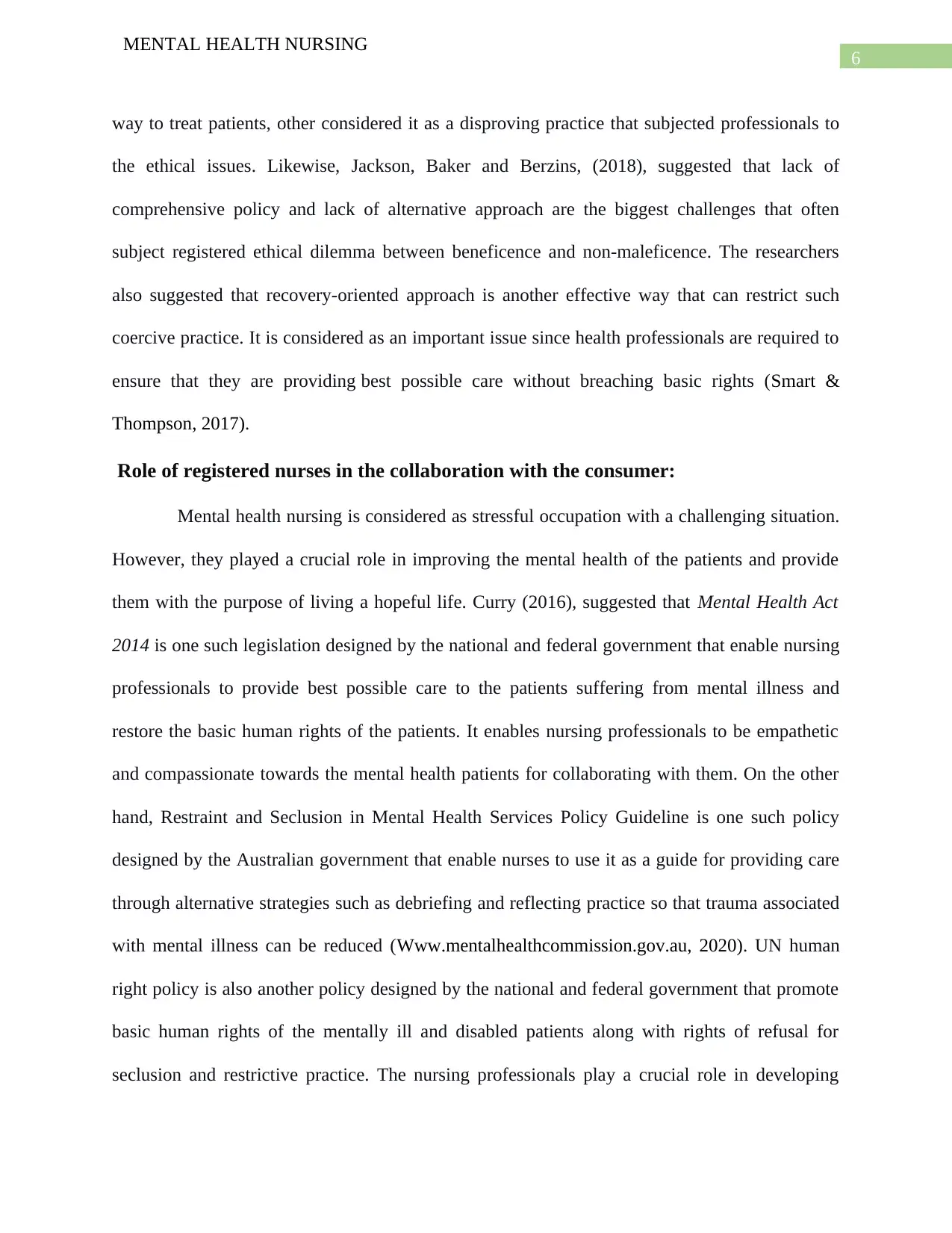
6
MENTAL HEALTH NURSING
way to treat patients, other considered it as a disproving practice that subjected professionals to
the ethical issues. Likewise, Jackson, Baker and Berzins, (2018), suggested that lack of
comprehensive policy and lack of alternative approach are the biggest challenges that often
subject registered ethical dilemma between beneficence and non-maleficence. The researchers
also suggested that recovery-oriented approach is another effective way that can restrict such
coercive practice. It is considered as an important issue since health professionals are required to
ensure that they are providing best possible care without breaching basic rights (Smart &
Thompson, 2017).
Role of registered nurses in the collaboration with the consumer:
Mental health nursing is considered as stressful occupation with a challenging situation.
However, they played a crucial role in improving the mental health of the patients and provide
them with the purpose of living a hopeful life. Curry (2016), suggested that Mental Health Act
2014 is one such legislation designed by the national and federal government that enable nursing
professionals to provide best possible care to the patients suffering from mental illness and
restore the basic human rights of the patients. It enables nursing professionals to be empathetic
and compassionate towards the mental health patients for collaborating with them. On the other
hand, Restraint and Seclusion in Mental Health Services Policy Guideline is one such policy
designed by the Australian government that enable nurses to use it as a guide for providing care
through alternative strategies such as debriefing and reflecting practice so that trauma associated
with mental illness can be reduced (Www.mentalhealthcommission.gov.au, 2020). UN human
right policy is also another policy designed by the national and federal government that promote
basic human rights of the mentally ill and disabled patients along with rights of refusal for
seclusion and restrictive practice. The nursing professionals play a crucial role in developing
MENTAL HEALTH NURSING
way to treat patients, other considered it as a disproving practice that subjected professionals to
the ethical issues. Likewise, Jackson, Baker and Berzins, (2018), suggested that lack of
comprehensive policy and lack of alternative approach are the biggest challenges that often
subject registered ethical dilemma between beneficence and non-maleficence. The researchers
also suggested that recovery-oriented approach is another effective way that can restrict such
coercive practice. It is considered as an important issue since health professionals are required to
ensure that they are providing best possible care without breaching basic rights (Smart &
Thompson, 2017).
Role of registered nurses in the collaboration with the consumer:
Mental health nursing is considered as stressful occupation with a challenging situation.
However, they played a crucial role in improving the mental health of the patients and provide
them with the purpose of living a hopeful life. Curry (2016), suggested that Mental Health Act
2014 is one such legislation designed by the national and federal government that enable nursing
professionals to provide best possible care to the patients suffering from mental illness and
restore the basic human rights of the patients. It enables nursing professionals to be empathetic
and compassionate towards the mental health patients for collaborating with them. On the other
hand, Restraint and Seclusion in Mental Health Services Policy Guideline is one such policy
designed by the Australian government that enable nurses to use it as a guide for providing care
through alternative strategies such as debriefing and reflecting practice so that trauma associated
with mental illness can be reduced (Www.mentalhealthcommission.gov.au, 2020). UN human
right policy is also another policy designed by the national and federal government that promote
basic human rights of the mentally ill and disabled patients along with rights of refusal for
seclusion and restrictive practice. The nursing professionals play a crucial role in developing
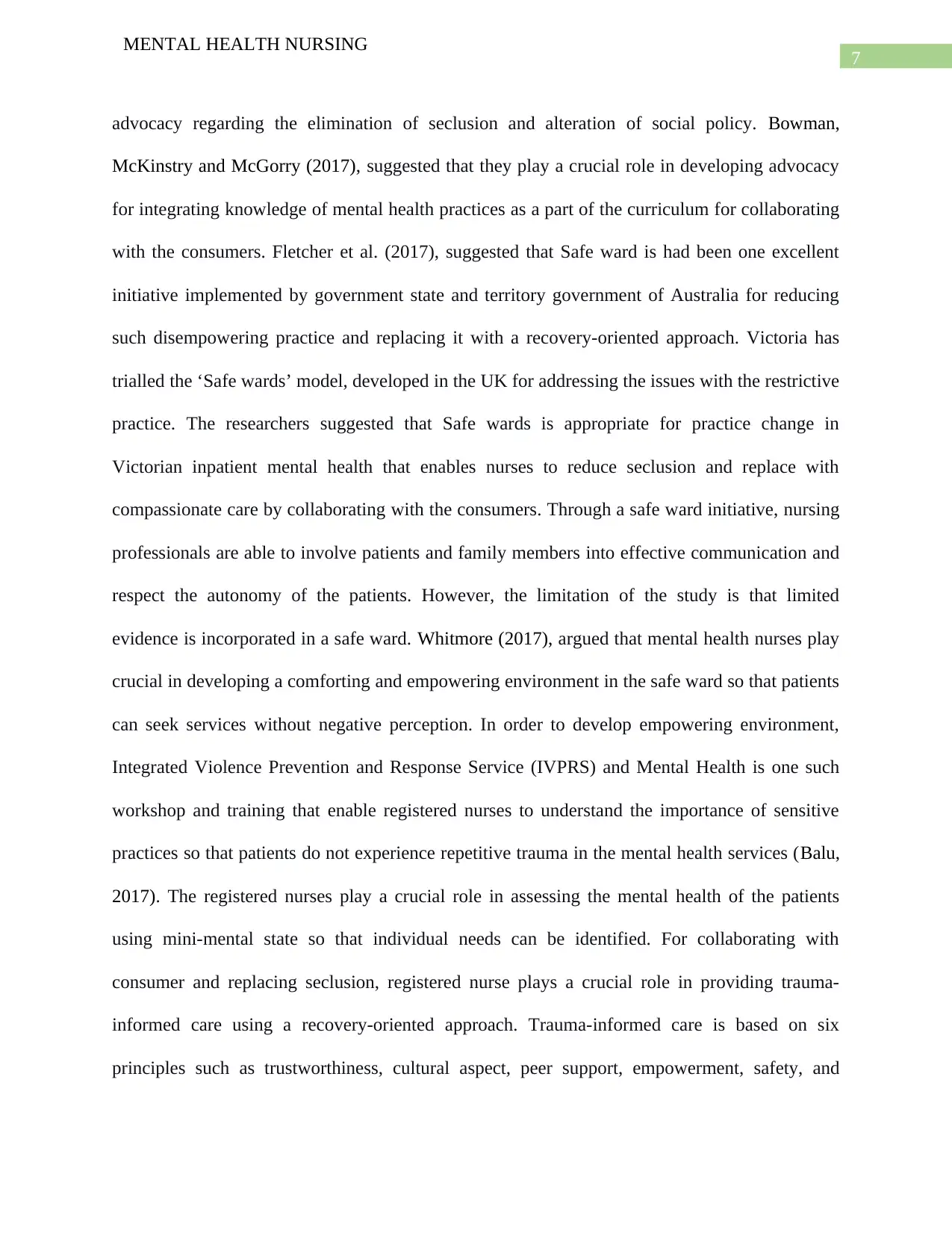
7
MENTAL HEALTH NURSING
advocacy regarding the elimination of seclusion and alteration of social policy. Bowman,
McKinstry and McGorry (2017), suggested that they play a crucial role in developing advocacy
for integrating knowledge of mental health practices as a part of the curriculum for collaborating
with the consumers. Fletcher et al. (2017), suggested that Safe ward is had been one excellent
initiative implemented by government state and territory government of Australia for reducing
such disempowering practice and replacing it with a recovery-oriented approach. Victoria has
trialled the ‘Safe wards’ model, developed in the UK for addressing the issues with the restrictive
practice. The researchers suggested that Safe wards is appropriate for practice change in
Victorian inpatient mental health that enables nurses to reduce seclusion and replace with
compassionate care by collaborating with the consumers. Through a safe ward initiative, nursing
professionals are able to involve patients and family members into effective communication and
respect the autonomy of the patients. However, the limitation of the study is that limited
evidence is incorporated in a safe ward. Whitmore (2017), argued that mental health nurses play
crucial in developing a comforting and empowering environment in the safe ward so that patients
can seek services without negative perception. In order to develop empowering environment,
Integrated Violence Prevention and Response Service (IVPRS) and Mental Health is one such
workshop and training that enable registered nurses to understand the importance of sensitive
practices so that patients do not experience repetitive trauma in the mental health services (Balu,
2017). The registered nurses play a crucial role in assessing the mental health of the patients
using mini-mental state so that individual needs can be identified. For collaborating with
consumer and replacing seclusion, registered nurse plays a crucial role in providing trauma-
informed care using a recovery-oriented approach. Trauma-informed care is based on six
principles such as trustworthiness, cultural aspect, peer support, empowerment, safety, and
MENTAL HEALTH NURSING
advocacy regarding the elimination of seclusion and alteration of social policy. Bowman,
McKinstry and McGorry (2017), suggested that they play a crucial role in developing advocacy
for integrating knowledge of mental health practices as a part of the curriculum for collaborating
with the consumers. Fletcher et al. (2017), suggested that Safe ward is had been one excellent
initiative implemented by government state and territory government of Australia for reducing
such disempowering practice and replacing it with a recovery-oriented approach. Victoria has
trialled the ‘Safe wards’ model, developed in the UK for addressing the issues with the restrictive
practice. The researchers suggested that Safe wards is appropriate for practice change in
Victorian inpatient mental health that enables nurses to reduce seclusion and replace with
compassionate care by collaborating with the consumers. Through a safe ward initiative, nursing
professionals are able to involve patients and family members into effective communication and
respect the autonomy of the patients. However, the limitation of the study is that limited
evidence is incorporated in a safe ward. Whitmore (2017), argued that mental health nurses play
crucial in developing a comforting and empowering environment in the safe ward so that patients
can seek services without negative perception. In order to develop empowering environment,
Integrated Violence Prevention and Response Service (IVPRS) and Mental Health is one such
workshop and training that enable registered nurses to understand the importance of sensitive
practices so that patients do not experience repetitive trauma in the mental health services (Balu,
2017). The registered nurses play a crucial role in assessing the mental health of the patients
using mini-mental state so that individual needs can be identified. For collaborating with
consumer and replacing seclusion, registered nurse plays a crucial role in providing trauma-
informed care using a recovery-oriented approach. Trauma-informed care is based on six
principles such as trustworthiness, cultural aspect, peer support, empowerment, safety, and
Paraphrase This Document
Need a fresh take? Get an instant paraphrase of this document with our AI Paraphraser
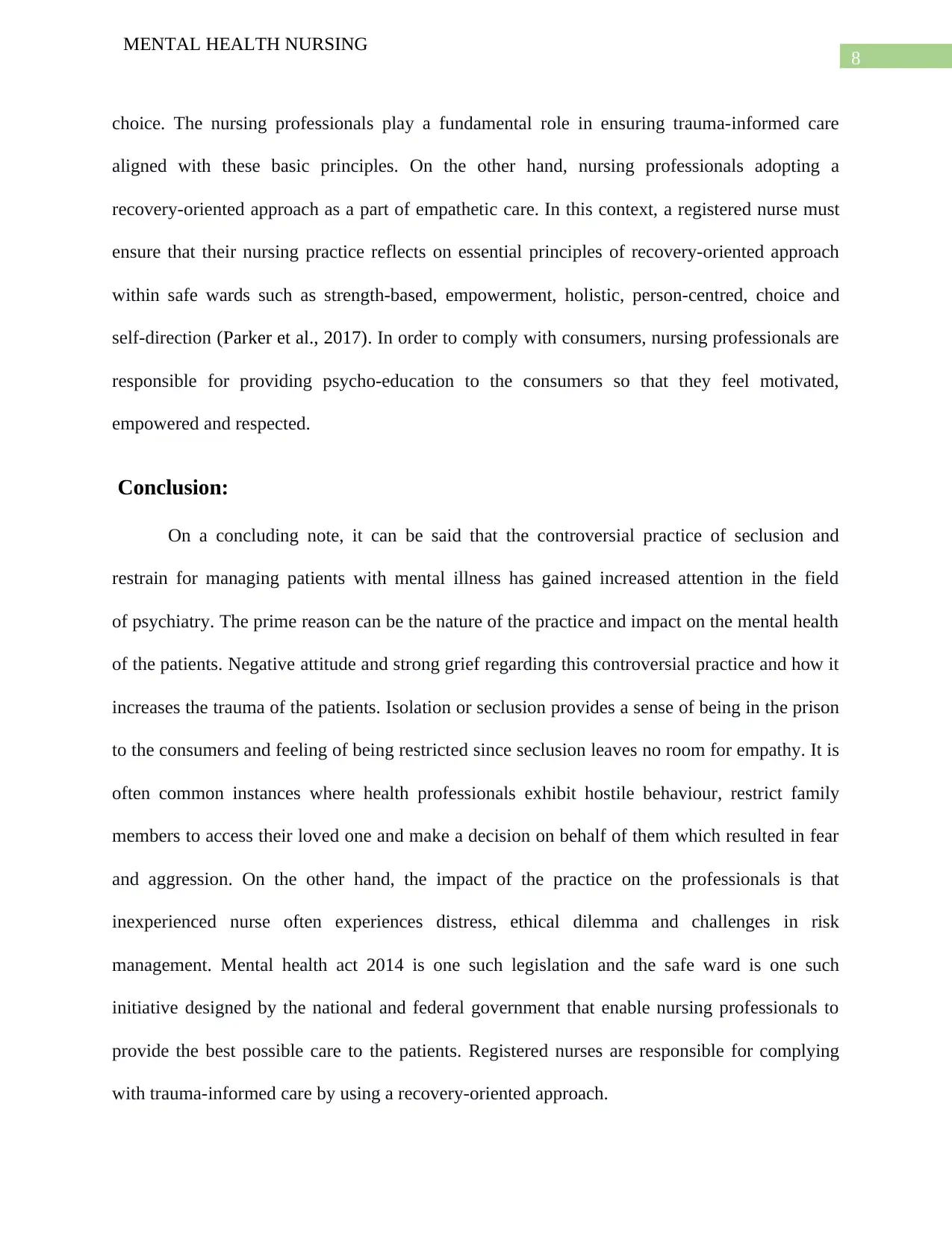
8
MENTAL HEALTH NURSING
choice. The nursing professionals play a fundamental role in ensuring trauma-informed care
aligned with these basic principles. On the other hand, nursing professionals adopting a
recovery-oriented approach as a part of empathetic care. In this context, a registered nurse must
ensure that their nursing practice reflects on essential principles of recovery-oriented approach
within safe wards such as strength-based, empowerment, holistic, person-centred, choice and
self-direction (Parker et al., 2017). In order to comply with consumers, nursing professionals are
responsible for providing psycho-education to the consumers so that they feel motivated,
empowered and respected.
Conclusion:
On a concluding note, it can be said that the controversial practice of seclusion and
restrain for managing patients with mental illness has gained increased attention in the field
of psychiatry. The prime reason can be the nature of the practice and impact on the mental health
of the patients. Negative attitude and strong grief regarding this controversial practice and how it
increases the trauma of the patients. Isolation or seclusion provides a sense of being in the prison
to the consumers and feeling of being restricted since seclusion leaves no room for empathy. It is
often common instances where health professionals exhibit hostile behaviour, restrict family
members to access their loved one and make a decision on behalf of them which resulted in fear
and aggression. On the other hand, the impact of the practice on the professionals is that
inexperienced nurse often experiences distress, ethical dilemma and challenges in risk
management. Mental health act 2014 is one such legislation and the safe ward is one such
initiative designed by the national and federal government that enable nursing professionals to
provide the best possible care to the patients. Registered nurses are responsible for complying
with trauma-informed care by using a recovery-oriented approach.
MENTAL HEALTH NURSING
choice. The nursing professionals play a fundamental role in ensuring trauma-informed care
aligned with these basic principles. On the other hand, nursing professionals adopting a
recovery-oriented approach as a part of empathetic care. In this context, a registered nurse must
ensure that their nursing practice reflects on essential principles of recovery-oriented approach
within safe wards such as strength-based, empowerment, holistic, person-centred, choice and
self-direction (Parker et al., 2017). In order to comply with consumers, nursing professionals are
responsible for providing psycho-education to the consumers so that they feel motivated,
empowered and respected.
Conclusion:
On a concluding note, it can be said that the controversial practice of seclusion and
restrain for managing patients with mental illness has gained increased attention in the field
of psychiatry. The prime reason can be the nature of the practice and impact on the mental health
of the patients. Negative attitude and strong grief regarding this controversial practice and how it
increases the trauma of the patients. Isolation or seclusion provides a sense of being in the prison
to the consumers and feeling of being restricted since seclusion leaves no room for empathy. It is
often common instances where health professionals exhibit hostile behaviour, restrict family
members to access their loved one and make a decision on behalf of them which resulted in fear
and aggression. On the other hand, the impact of the practice on the professionals is that
inexperienced nurse often experiences distress, ethical dilemma and challenges in risk
management. Mental health act 2014 is one such legislation and the safe ward is one such
initiative designed by the national and federal government that enable nursing professionals to
provide the best possible care to the patients. Registered nurses are responsible for complying
with trauma-informed care by using a recovery-oriented approach.
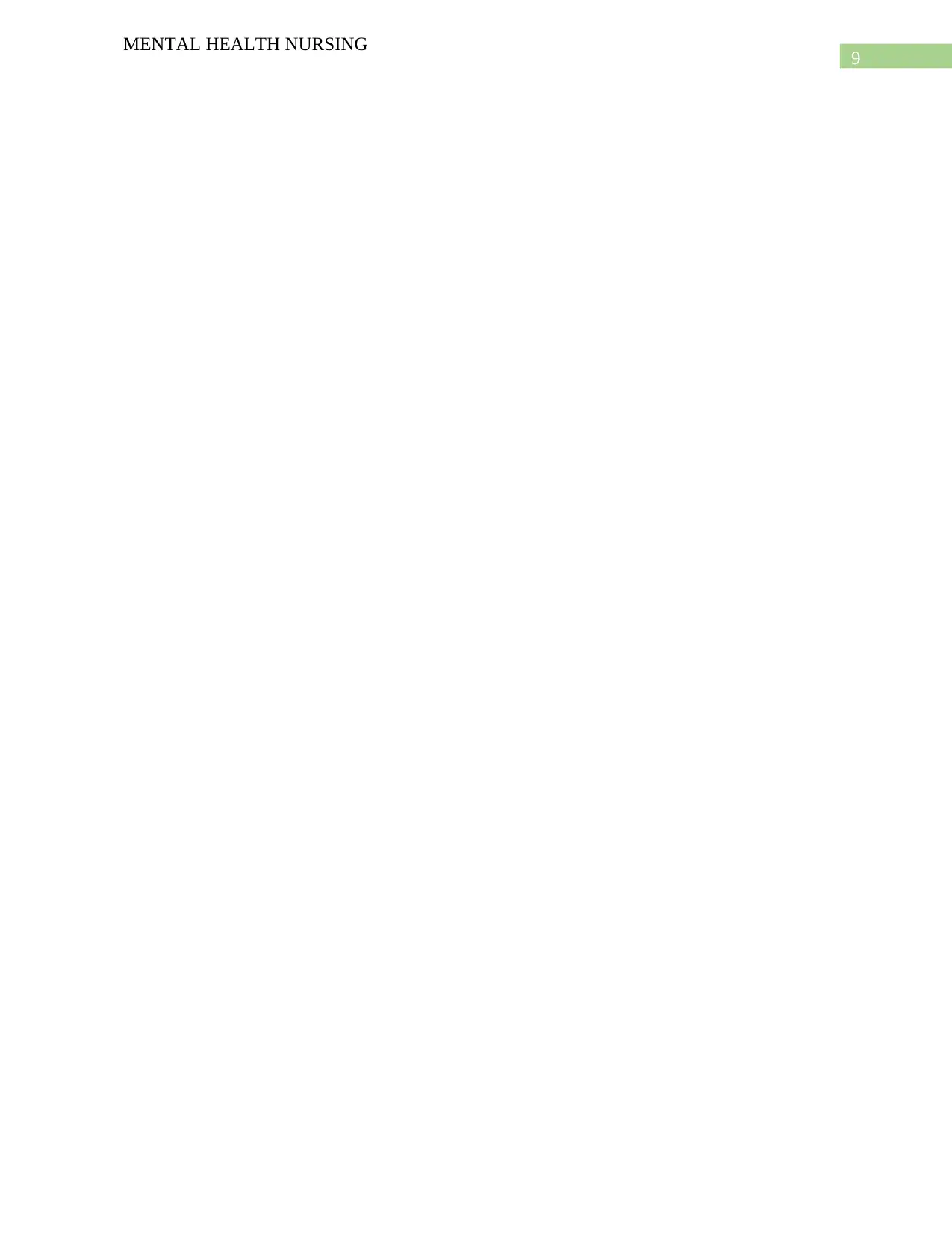
9
MENTAL HEALTH NURSING
MENTAL HEALTH NURSING
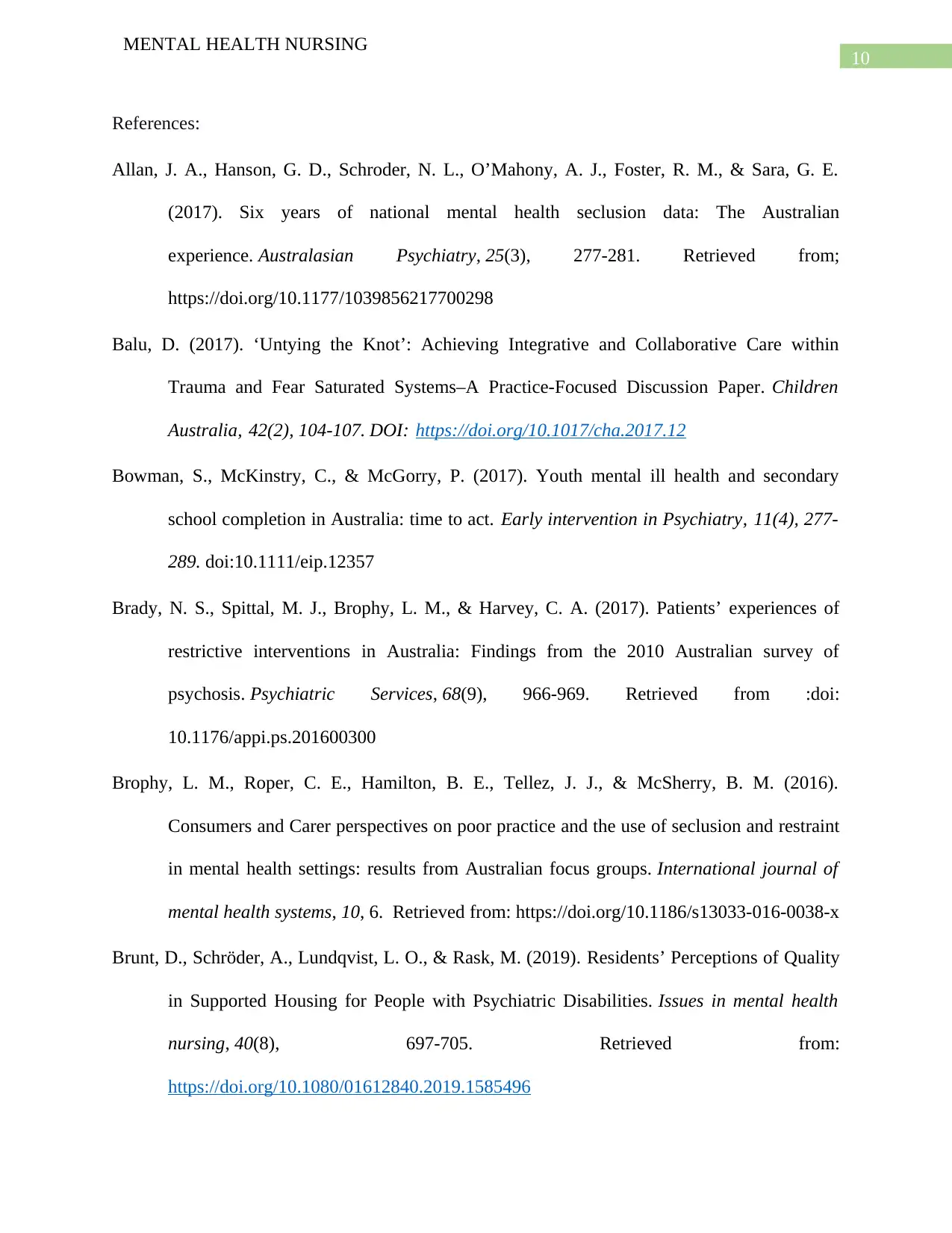
10
MENTAL HEALTH NURSING
References:
Allan, J. A., Hanson, G. D., Schroder, N. L., O’Mahony, A. J., Foster, R. M., & Sara, G. E.
(2017). Six years of national mental health seclusion data: The Australian
experience. Australasian Psychiatry, 25(3), 277-281. Retrieved from;
https://doi.org/10.1177/1039856217700298
Balu, D. (2017). ‘Untying the Knot’: Achieving Integrative and Collaborative Care within
Trauma and Fear Saturated Systems–A Practice-Focused Discussion Paper. Children
Australia, 42(2), 104-107. DOI: https://doi.org/10.1017/cha.2017.12
Bowman, S., McKinstry, C., & McGorry, P. (2017). Youth mental ill health and secondary
school completion in Australia: time to act. Early intervention in Psychiatry, 11(4), 277-
289. doi:10.1111/eip.12357
Brady, N. S., Spittal, M. J., Brophy, L. M., & Harvey, C. A. (2017). Patients’ experiences of
restrictive interventions in Australia: Findings from the 2010 Australian survey of
psychosis. Psychiatric Services, 68(9), 966-969. Retrieved from :doi:
10.1176/appi.ps.201600300
Brophy, L. M., Roper, C. E., Hamilton, B. E., Tellez, J. J., & McSherry, B. M. (2016).
Consumers and Carer perspectives on poor practice and the use of seclusion and restraint
in mental health settings: results from Australian focus groups. International journal of
mental health systems, 10, 6. Retrieved from: https://doi.org/10.1186/s13033-016-0038-x
Brunt, D., Schröder, A., Lundqvist, L. O., & Rask, M. (2019). Residents’ Perceptions of Quality
in Supported Housing for People with Psychiatric Disabilities. Issues in mental health
nursing, 40(8), 697-705. Retrieved from:
https://doi.org/10.1080/01612840.2019.1585496
MENTAL HEALTH NURSING
References:
Allan, J. A., Hanson, G. D., Schroder, N. L., O’Mahony, A. J., Foster, R. M., & Sara, G. E.
(2017). Six years of national mental health seclusion data: The Australian
experience. Australasian Psychiatry, 25(3), 277-281. Retrieved from;
https://doi.org/10.1177/1039856217700298
Balu, D. (2017). ‘Untying the Knot’: Achieving Integrative and Collaborative Care within
Trauma and Fear Saturated Systems–A Practice-Focused Discussion Paper. Children
Australia, 42(2), 104-107. DOI: https://doi.org/10.1017/cha.2017.12
Bowman, S., McKinstry, C., & McGorry, P. (2017). Youth mental ill health and secondary
school completion in Australia: time to act. Early intervention in Psychiatry, 11(4), 277-
289. doi:10.1111/eip.12357
Brady, N. S., Spittal, M. J., Brophy, L. M., & Harvey, C. A. (2017). Patients’ experiences of
restrictive interventions in Australia: Findings from the 2010 Australian survey of
psychosis. Psychiatric Services, 68(9), 966-969. Retrieved from :doi:
10.1176/appi.ps.201600300
Brophy, L. M., Roper, C. E., Hamilton, B. E., Tellez, J. J., & McSherry, B. M. (2016).
Consumers and Carer perspectives on poor practice and the use of seclusion and restraint
in mental health settings: results from Australian focus groups. International journal of
mental health systems, 10, 6. Retrieved from: https://doi.org/10.1186/s13033-016-0038-x
Brunt, D., Schröder, A., Lundqvist, L. O., & Rask, M. (2019). Residents’ Perceptions of Quality
in Supported Housing for People with Psychiatric Disabilities. Issues in mental health
nursing, 40(8), 697-705. Retrieved from:
https://doi.org/10.1080/01612840.2019.1585496
Secure Best Marks with AI Grader
Need help grading? Try our AI Grader for instant feedback on your assignments.
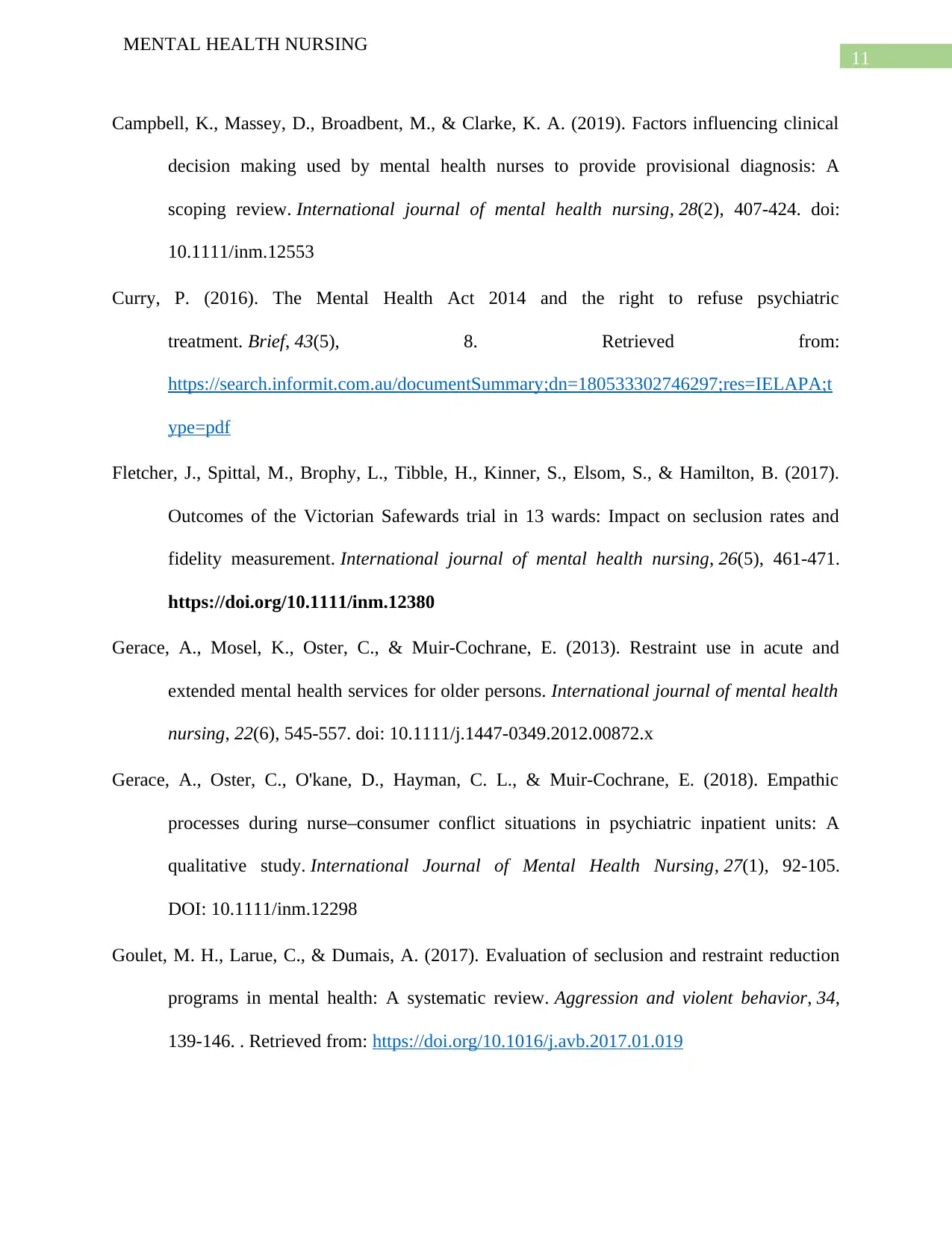
11
MENTAL HEALTH NURSING
Campbell, K., Massey, D., Broadbent, M., & Clarke, K. A. (2019). Factors influencing clinical
decision making used by mental health nurses to provide provisional diagnosis: A
scoping review. International journal of mental health nursing, 28(2), 407-424. doi:
10.1111/inm.12553
Curry, P. (2016). The Mental Health Act 2014 and the right to refuse psychiatric
treatment. Brief, 43(5), 8. Retrieved from:
https://search.informit.com.au/documentSummary;dn=180533302746297;res=IELAPA;t
ype=pdf
Fletcher, J., Spittal, M., Brophy, L., Tibble, H., Kinner, S., Elsom, S., & Hamilton, B. (2017).
Outcomes of the Victorian Safewards trial in 13 wards: Impact on seclusion rates and
fidelity measurement. International journal of mental health nursing, 26(5), 461-471.
https://doi.org/10.1111/inm.12380
Gerace, A., Mosel, K., Oster, C., & Muir‐Cochrane, E. (2013). Restraint use in acute and
extended mental health services for older persons. International journal of mental health
nursing, 22(6), 545-557. doi: 10.1111/j.1447-0349.2012.00872.x
Gerace, A., Oster, C., O'kane, D., Hayman, C. L., & Muir‐Cochrane, E. (2018). Empathic
processes during nurse–consumer conflict situations in psychiatric inpatient units: A
qualitative study. International Journal of Mental Health Nursing, 27(1), 92-105.
DOI: 10.1111/inm.12298
Goulet, M. H., Larue, C., & Dumais, A. (2017). Evaluation of seclusion and restraint reduction
programs in mental health: A systematic review. Aggression and violent behavior, 34,
139-146. . Retrieved from: https://doi.org/10.1016/j.avb.2017.01.019
MENTAL HEALTH NURSING
Campbell, K., Massey, D., Broadbent, M., & Clarke, K. A. (2019). Factors influencing clinical
decision making used by mental health nurses to provide provisional diagnosis: A
scoping review. International journal of mental health nursing, 28(2), 407-424. doi:
10.1111/inm.12553
Curry, P. (2016). The Mental Health Act 2014 and the right to refuse psychiatric
treatment. Brief, 43(5), 8. Retrieved from:
https://search.informit.com.au/documentSummary;dn=180533302746297;res=IELAPA;t
ype=pdf
Fletcher, J., Spittal, M., Brophy, L., Tibble, H., Kinner, S., Elsom, S., & Hamilton, B. (2017).
Outcomes of the Victorian Safewards trial in 13 wards: Impact on seclusion rates and
fidelity measurement. International journal of mental health nursing, 26(5), 461-471.
https://doi.org/10.1111/inm.12380
Gerace, A., Mosel, K., Oster, C., & Muir‐Cochrane, E. (2013). Restraint use in acute and
extended mental health services for older persons. International journal of mental health
nursing, 22(6), 545-557. doi: 10.1111/j.1447-0349.2012.00872.x
Gerace, A., Oster, C., O'kane, D., Hayman, C. L., & Muir‐Cochrane, E. (2018). Empathic
processes during nurse–consumer conflict situations in psychiatric inpatient units: A
qualitative study. International Journal of Mental Health Nursing, 27(1), 92-105.
DOI: 10.1111/inm.12298
Goulet, M. H., Larue, C., & Dumais, A. (2017). Evaluation of seclusion and restraint reduction
programs in mental health: A systematic review. Aggression and violent behavior, 34,
139-146. . Retrieved from: https://doi.org/10.1016/j.avb.2017.01.019
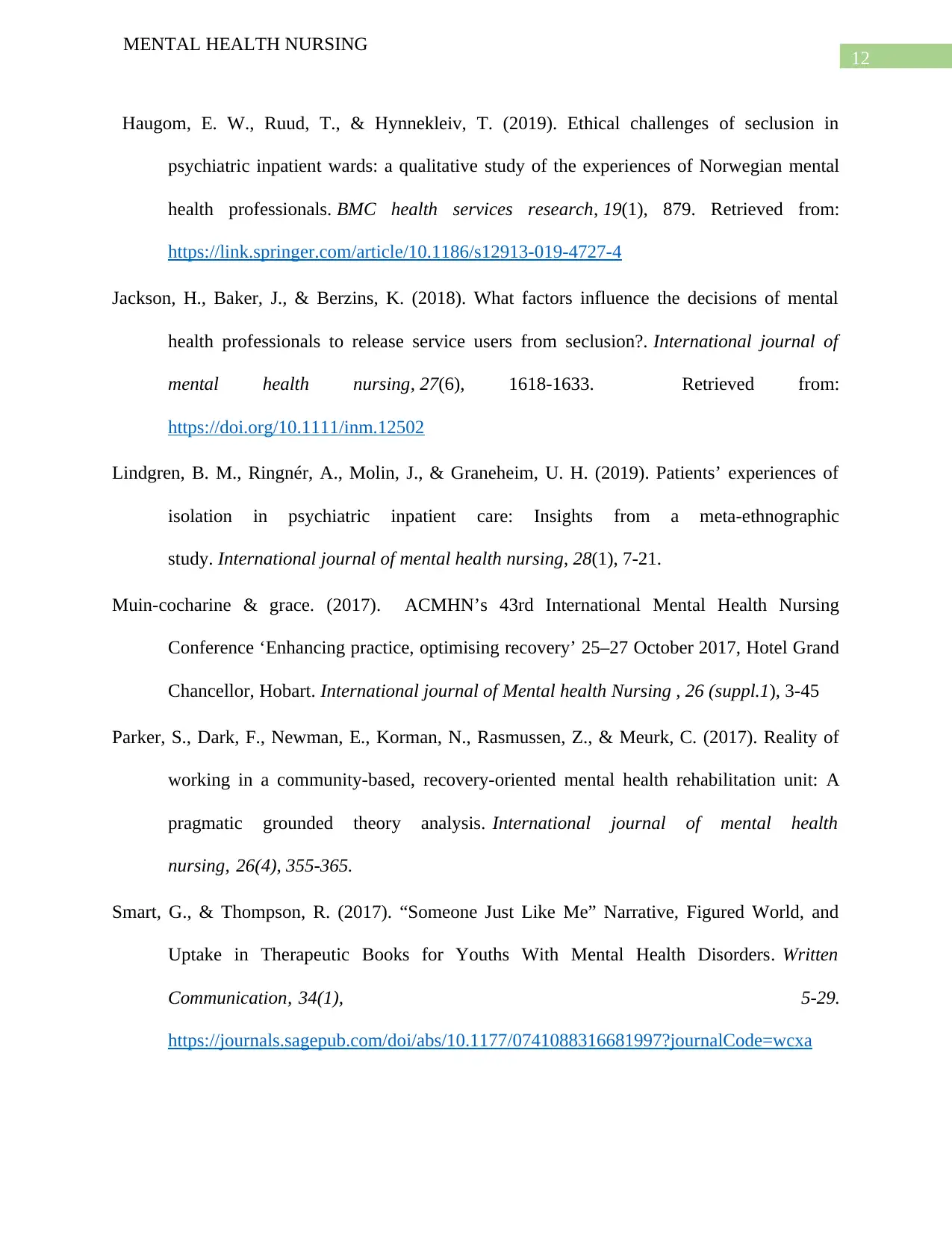
12
MENTAL HEALTH NURSING
Haugom, E. W., Ruud, T., & Hynnekleiv, T. (2019). Ethical challenges of seclusion in
psychiatric inpatient wards: a qualitative study of the experiences of Norwegian mental
health professionals. BMC health services research, 19(1), 879. Retrieved from:
https://link.springer.com/article/10.1186/s12913-019-4727-4
Jackson, H., Baker, J., & Berzins, K. (2018). What factors influence the decisions of mental
health professionals to release service users from seclusion?. International journal of
mental health nursing, 27(6), 1618-1633. Retrieved from:
https://doi.org/10.1111/inm.12502
Lindgren, B. M., Ringnér, A., Molin, J., & Graneheim, U. H. (2019). Patients’ experiences of
isolation in psychiatric inpatient care: Insights from a meta‐ethnographic
study. International journal of mental health nursing, 28(1), 7-21.
Muin-cocharine & grace. (2017). ACMHN’s 43rd International Mental Health Nursing
Conference ‘Enhancing practice, optimising recovery’ 25–27 October 2017, Hotel Grand
Chancellor, Hobart. International journal of Mental health Nursing , 26 (suppl.1), 3-45
Parker, S., Dark, F., Newman, E., Korman, N., Rasmussen, Z., & Meurk, C. (2017). Reality of
working in a community‐based, recovery‐oriented mental health rehabilitation unit: A
pragmatic grounded theory analysis. International journal of mental health
nursing, 26(4), 355-365.
Smart, G., & Thompson, R. (2017). “Someone Just Like Me” Narrative, Figured World, and
Uptake in Therapeutic Books for Youths With Mental Health Disorders. Written
Communication, 34(1), 5-29.
https://journals.sagepub.com/doi/abs/10.1177/0741088316681997?journalCode=wcxa
MENTAL HEALTH NURSING
Haugom, E. W., Ruud, T., & Hynnekleiv, T. (2019). Ethical challenges of seclusion in
psychiatric inpatient wards: a qualitative study of the experiences of Norwegian mental
health professionals. BMC health services research, 19(1), 879. Retrieved from:
https://link.springer.com/article/10.1186/s12913-019-4727-4
Jackson, H., Baker, J., & Berzins, K. (2018). What factors influence the decisions of mental
health professionals to release service users from seclusion?. International journal of
mental health nursing, 27(6), 1618-1633. Retrieved from:
https://doi.org/10.1111/inm.12502
Lindgren, B. M., Ringnér, A., Molin, J., & Graneheim, U. H. (2019). Patients’ experiences of
isolation in psychiatric inpatient care: Insights from a meta‐ethnographic
study. International journal of mental health nursing, 28(1), 7-21.
Muin-cocharine & grace. (2017). ACMHN’s 43rd International Mental Health Nursing
Conference ‘Enhancing practice, optimising recovery’ 25–27 October 2017, Hotel Grand
Chancellor, Hobart. International journal of Mental health Nursing , 26 (suppl.1), 3-45
Parker, S., Dark, F., Newman, E., Korman, N., Rasmussen, Z., & Meurk, C. (2017). Reality of
working in a community‐based, recovery‐oriented mental health rehabilitation unit: A
pragmatic grounded theory analysis. International journal of mental health
nursing, 26(4), 355-365.
Smart, G., & Thompson, R. (2017). “Someone Just Like Me” Narrative, Figured World, and
Uptake in Therapeutic Books for Youths With Mental Health Disorders. Written
Communication, 34(1), 5-29.
https://journals.sagepub.com/doi/abs/10.1177/0741088316681997?journalCode=wcxa
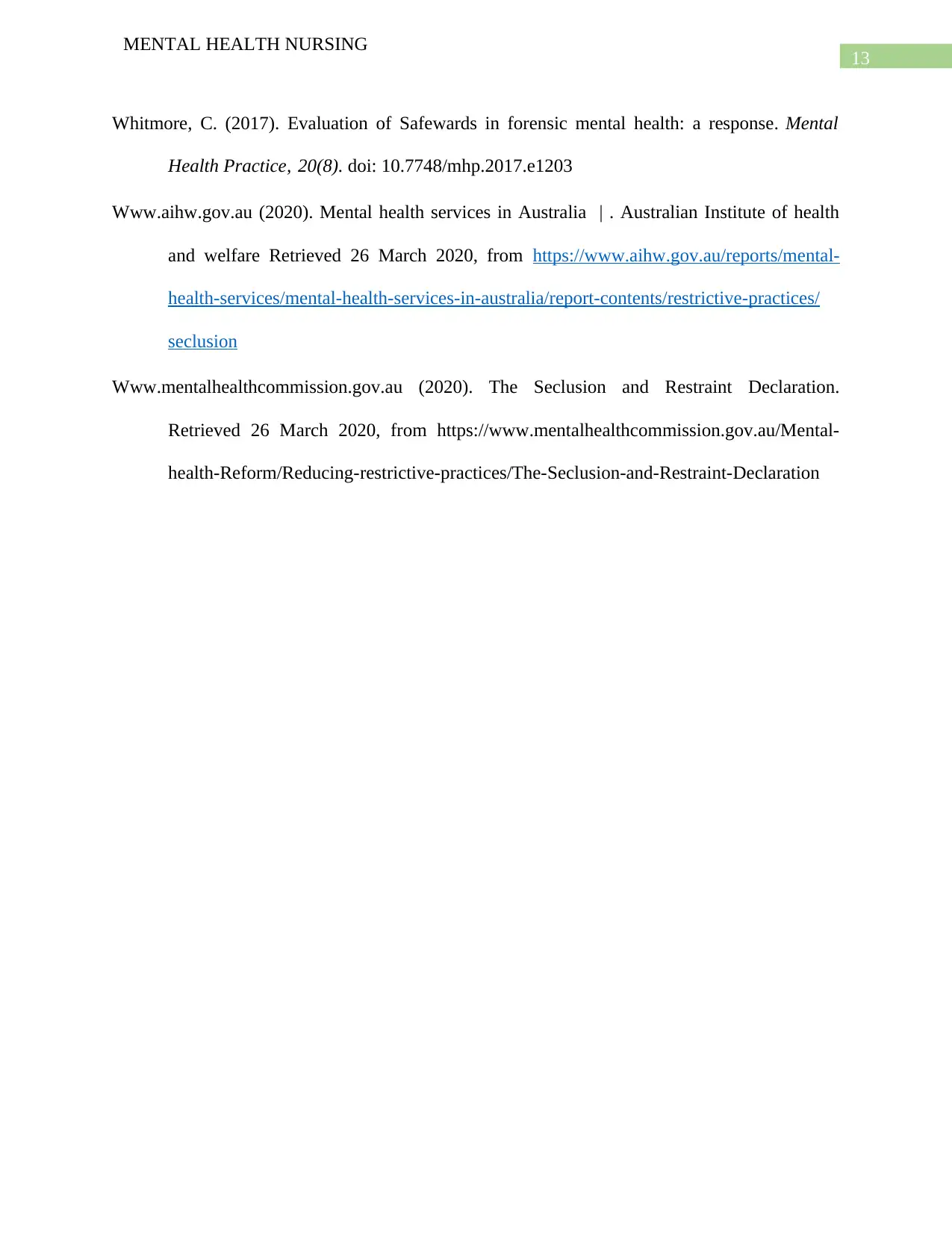
13
MENTAL HEALTH NURSING
Whitmore, C. (2017). Evaluation of Safewards in forensic mental health: a response. Mental
Health Practice, 20(8). doi: 10.7748/mhp.2017.e1203
Www.aihw.gov.au (2020). Mental health services in Australia | . Australian Institute of health
and welfare Retrieved 26 March 2020, from https://www.aihw.gov.au/reports/mental-
health-services/mental-health-services-in-australia/report-contents/restrictive-practices/
seclusion
Www.mentalhealthcommission.gov.au (2020). The Seclusion and Restraint Declaration.
Retrieved 26 March 2020, from https://www.mentalhealthcommission.gov.au/Mental-
health-Reform/Reducing-restrictive-practices/The-Seclusion-and-Restraint-Declaration
MENTAL HEALTH NURSING
Whitmore, C. (2017). Evaluation of Safewards in forensic mental health: a response. Mental
Health Practice, 20(8). doi: 10.7748/mhp.2017.e1203
Www.aihw.gov.au (2020). Mental health services in Australia | . Australian Institute of health
and welfare Retrieved 26 March 2020, from https://www.aihw.gov.au/reports/mental-
health-services/mental-health-services-in-australia/report-contents/restrictive-practices/
seclusion
Www.mentalhealthcommission.gov.au (2020). The Seclusion and Restraint Declaration.
Retrieved 26 March 2020, from https://www.mentalhealthcommission.gov.au/Mental-
health-Reform/Reducing-restrictive-practices/The-Seclusion-and-Restraint-Declaration
1 out of 13
Related Documents
Your All-in-One AI-Powered Toolkit for Academic Success.
+13062052269
info@desklib.com
Available 24*7 on WhatsApp / Email
![[object Object]](/_next/static/media/star-bottom.7253800d.svg)
Unlock your academic potential
© 2024 | Zucol Services PVT LTD | All rights reserved.





